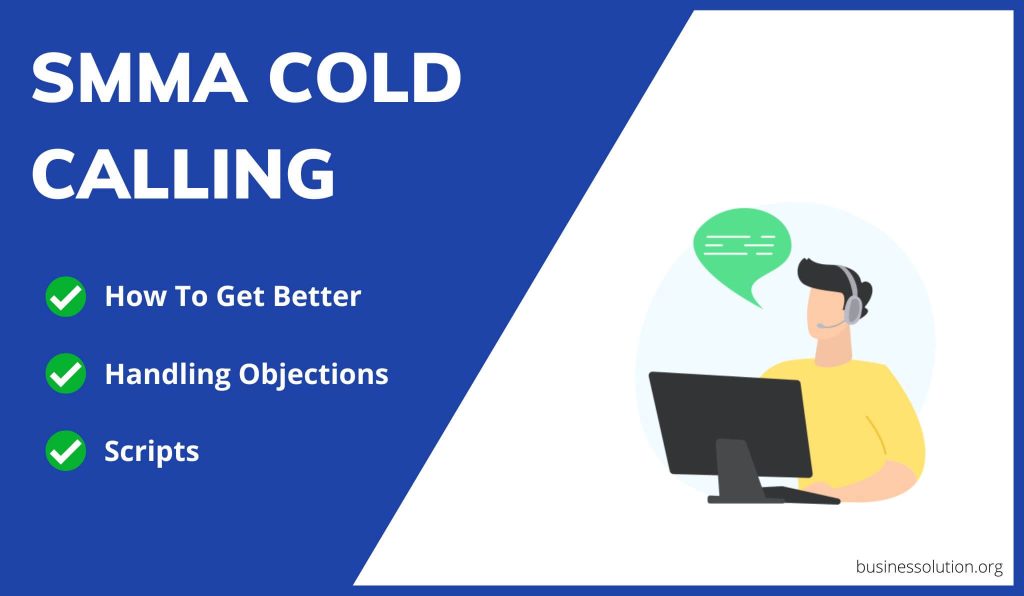A solid cold calling script is vital to your success when trying to sell your service. Today, I’m going to be running through how to write your own cold calling script for your SMMA business, regardless of your industry. That’s where my experience lies with my current marketing agency.
First of all, we will be talking about the importance of a script and whether you need it.
Let’s get started.
Table of Contents
The Importance of a Cold Calling Script
Cold-calling script is the biggie. Getting this script right is the secret to getting your first SMMA client. It’s the key, it’s the fundamental, it’s core to success in cold calling for SMMA businesses.
Cold calling has been around for years and years and years. It’s the OG of outreach. These days, it really wants to be used as part of a multi-platform strategy. You want to use cold calling as one of your outreach strategies in your bigger-picture sales process.
Script or No Script: Addressing Common Concerns
One of the most common questions people ask is:
- Do I need a script, or do I not need a script?
- Is it going to make me robotic?
- Is it going to make you sound like a salesperson?
- Am I going to have to hold it in front of me?
The misconception that you need to get out of your mind, the common conception that people have about call scripts, is that it’s this physical piece of paper that they’re going to be holding in front of them. That’s not what I want you to do at all.
I want you to memorize this script. I don’t want you to be holding this piece of paper, reading from it. I want you to treat it as if it was a monolog in drama in high school. We’ve all done their monologs and drama. You learn that script.
Once you actually learn it and internalize it, you can truly master the tonality because that’s when you understand why you’re saying what you’re saying and not just what you’re saying on a piece of paper.
That is when you separate yourself from the other agency owners who sound robotic and salesy and struggle to close.
What really separates good salespeople from average salespeople is their sales script and the ability to master their tonality and the way they execute their script.
We’re not going to call it a script. It’s the structure. It’s the framework. It’s the blueprint.
5 Key Elements of a Cold Calling Script
Here are the five things that you want to include in your cold calling script.
1. Diffuse Initial Resistance
The biggest mistake that I see in so many sales scripts is when I see someone say,
“Hey, how are you doing?”
“Hey, how’s your day going?”
This fake rapport building. You don’t care how their day is. You don’t care what they’re up to or how they’re doing. You don’t know the person you’re calling. They don’t care.
If you care about that, it’s just this fake facade of niceness. It just doesn’t work. It doesn’t wash because every salesperson thinks that they should say that to build rapport. However, it’s not building genuine rapport at all.
You’re saying it to absolutely everybody. Hey, how are you doing? It’s just a false conversation, and it doesn’t need to be in there. In fact, the best thing for you to do is diffuse them on the thing they’re worried about the most, and that’s you wasting their time.
They do not want their time wasted. They get pitched all the time. If you’re doing business to business, these people you’re calling up, they are getting pitched day in, day out.
That’s one of the things you need to recognize. How can I separate myself from everybody else, which is calling that person up?
So diffuse them right away and diffuse them on time. You could say,
“Hey, John, I know you’re busy, so I’ll be quick.”
“Hey, John, have I caught you in the middle of something?”
You can ask that question. You could almost be a little bit of a role reversal because no normal salesperson would ask somebody, Have I caught you in the middle of something? They can then potentially give you an objection. Actually, it works the other way around. It then proves that you have respect for them, and therefore, they’re going to trust you a lot more and be more inclined to give you their time.
Because you should be grateful for the time of someone that you don’t know. Make sure you diffuse them right away. You don’t bother about that fake small talk.
2. Craft a Concise and Impactful Introduction
We want to say who we are, where we’re from, and what our company actually does. Keep it this really short, no waffle. This is the whole theme of how your cold calling script should be in this day and age.
Gone are the days of these A4 pieces of paper, this long script where you could get away with pitching someone over the phone for about five minutes without them saying anything. It doesn’t work.
You need to make sure you’re not waffling, you get straight to the point, and you respect the person you’re speaking to.
You can say something like,
“My name is [Your Name]. I’m the managing director of the [Your Agency], and I help restaurants get more clients per month using social media ads.”
You could say something that is relevant to your service. But make sure it is relevant to you, who you are, where you’re from, and exactly what you do in just one sentence. It doesn’t need to be longer than that.
3. Personalize the ‘Why’ of Your Call
When they’re going to say what is the reason we called, this is where we want to introduce some personal touch. We want to say something that says to that person that we have only called up them, that they’re not just one part of some big Excel spreadsheet.
What information can we dig up on them?
Can we say something that’s relevant?
Basically, you want to highlight something unique to them.
As a marketing agency, I could say something like, “I was on your Facebook profile earlier, and I noticed the range you brought out recently. How’s that going?”
You could ask them a question about their product or their service, something unique to them.
Just build some rapport. This is your chance to build rapport with the business owner.
You’re telling them why this is what you’re actually called, but you could drop something in there to let them know, like a little bit of tangent conversation to let them know that you’ve actually done your research on them.
Or you could just say something which is unique to them:
“Hey, I saw you’re running some ads at the moment. I’ve seen that retargeting ad. That’s a really nice copy you’ve got going on there. But actually [You can tell them what it is you can do to improve on that for them.]”
This is my tip. Give them a compliment on something unique to them, personal to them, and then you can serve them up the fact that you can improve it. You don’t want to go straight in.
The big mistake people are making is to go straight in, all guns blazing; you’re doing something wrong.
We’re just going to put them on the back foot. They’re going to feel attacked. You need to make sure if you are going to deliver criticism to somebody, you deliver it with a compliment as well.
You make them feel good, then give them some criticism, and then at the end of the call, you will make them feel good again.
You’re going to offer them something that they really want. That is your why. Why is it you’re actually calling and how can you make this unique to them. What can you add there in your sales pitch, something unique about them that makes them feel personal, like you personally outreach them.
Qualification: Identifying Suitable Clients
Now, at this point, we can ask them a question to qualify whether they are suitable for our service. For example, if we are a marketing agent, so if we could ask them:
- What is your current marketing strategy?
- Have you run ads before?
- Have you used Facebook ads before?
And you’re asking them a question to pre-qualify whether they are actually a suitable client for you.
You’re going to make them think about whether they want your product or your service before you’ve even offered it to them. A
s I said, you don’t always need to do this. There will be instances when you already know that this person is qualified. They’re already really keen.
You think that the conversation is going well, and you’re pretty sure that you can get out of them what you want to get out of them. The majority of the time in SMMA, it’s going to be getting some a meeting with them, some a follow-up call, so you can actually close them.
I wouldn’t recommend you selling on a cold call if you have a B2B client. People need warming up. You want to arrange some a meeting with them.
But on the flip side, that person is a bit standoffish. They don’t really sound interested. When they answer the phone, they sound like what? You might want to dig deeper.
You might want to try and get some conversation out of them, build some rapport with them, and ask them a question about their business, about whether they are doing something that you provide for them already.
Ask them a question that makes them think about your service before you actually deliver it to them on the actual call.
Defining the ‘What’: Your Call to Action
What do we actually want? We could transition to the what just by saying something like,
“The reason for my call is I want to see if you’ve got 10-15 minutes over the next couple of days or so I can share some ideas with you. I can talk you through this. I can talk through how this works. I can see whether we’re a good fit for each other.”
That’s a good one to say. I can see whether we’re a good fit for each other. That’s a nice bit of psychology in there. The key to why that actually works, and I’ve used this in many sales scripts before, is you’re almost de-qualifying somebody.
You’re almost saying you might not be the person we want to work with. One thing we’ve introduced into our cold call pitches is something like:
“I’m only looking to take on one or two new clients this month,” or
“We only have the capacity to take on one new e-commerce client this month.”
To them, it’s like, I want to be that person.
You create that scarcity and that desire. Scarcity in marketing is a technique that makes people want to buy from you.
You can introduce that into your script somewhere by saying to them, by de-qualifying them. You’ve got either a qualification or a de-qualification, something like that:
“We’re only looking to take on 1 or 2 new clients this month. But I want to see over the next couple of days if you’re free for 10-15 minutes so we can see whether we’re a good fit for each other.”
In which case, they’re going to be like, Well, yeah, obviously, I’m a good fit for this company. What do you mean? Why wouldn’t I be a good fit? Let’s have this call, and let’s see if I am.
It’s that reverse psychology, and it works really, really well.
So what do we actually want from this call? Do we want to sell them our service? Do we want to have a meeting with them?
Then you go ahead and actually arrange all the technicalities.
Handling Objections in Cold Calling: Turning ‘No’ into ‘Yes’
Now, the majority of the time, these calls aren’t going to go the way you want them. That’s just the way it is. That’s just sales. You don’t always get a plain sailing yes without any hiccups. You’re going to get some objection. This is a numbers game.
But an objection is not a rejection. It’s just a request for more information. Remember that. Any good salesperson will push back on an objection.
The majority of the meetings we have at our marketing agency is when we push back on some request for more information.
For example, if somebody says to us, “Well, I don’t have the time,” This is a really common one.
Your answer to this objection could be like:
“So when are you going to have the time to increase your sales? When are you going to have the time to increase your client base? I thought you just told me you want to expand your business. When are you going to have the time to do that?”
“Okay, so you don’t have the time now. That’s fine. What about tomorrow? What about next week?”
And that’s just one objection that you can get. Another objection is: “I’m not interested.”
You answer could be like:
“Okay, fine. I presume you’re making a lot of money from Facebook ads at the moment. If not, why would you not be interested in making more money from a new source? I just want to share 15 minutes with you over the next couple of days. What have you got to lose?”
The question of “what have you got to lose?” is super powerful. They haven’t got anything to lose. You’d just overcome these objections.
How to Prepare for Objections?
The best thing to do to prepare for objections in cold calling is to write down every possible objection that you could get or over 100 cold calls. Just write down every objection that you’re getting and then write down an answer next to that.
Over time, you’re going to master objections. Just like with SMMA email outreach, the secret is in the follow-up that the success is in the follow-up. It’s not in the initial outreach. It’s the exact same for cold calling, where the success is in the objection handling.
You don’t get it the first time. And if you give up on the first hurdle, you don’t deserve the sale or the meeting in the first place. You need to push back again and again and again and again until that person doesn’t want you on the phone anymore.
Because you don’t want to just burn a lead with an objection if there’s just a request for more information, a really simple, easy request, but more information that you could have given them.
Make sure you always, always, always push back on objections.
How to Get Better at Cold Calling
Now, once you’ve actually written out your script and you’ve internalized it, you’ve learned it, I’ve got a huge tip for you. This is a massive one. This will help me improve my sales adequately more than anything else. That was recording my cold calls. You can easily do that with a cold calling software like JustCall or GoHighLevel (30 day free trial)
Record your cold calls over a period of 7-14 days, judge them, and critique them.
Even better, have other people critique them. Judge the way that you are pronouncing and delivering every single word, every single sentence, and play with it over time and continue recording it.
Over a period of a month or two months, you’re really going to master your own script because you’re going to be able to listen to it subjectively.
When you’re saying things, you’re not actually hearing what the other person is hearing. You’re only hearing what you’re saying in your own voice, and you’re actually thinking about what you’re going to say next. You’re not actually paying attention to what’s really coming out of your mouth.
The only way to truly judge that is by recording yourself. It’s super uncomfortable, but it’s where you’re going to see the most growth in your sales delivery.
I hope it gives you enough to go on to create your cold calling script. I hope you’ve got a ton of value from this.




